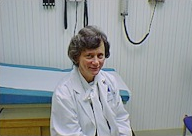 The Genetic Counselor and Medical Geneticist together work
with the other specialists on the craniofacial team to help determine if there could be
a chromosomal single gene or other significant medical problem associated with the cleft lip
and/or palate. One in 30 babies is born with an identified birth defect and by the age of
two as many as one in ten children has an identified genetic condition. Every child
inherits 100,000 genes, 50,000 from each parent. There are a number of inherited messages
or genes that interact to form the face, palate, or lip, and that can cause an identified
problem. In reviewing the medical prenatal, family histories and physical examination, it
is often possible to identify specific factors that contributed to the baby's cleft lip
and palate. Also in identifying some syndromes, it is possible to make predictions with
regard to other problems that the child might develop, as well as provide appropriate
intervention based on the specific etiology or cause.
The Genetic Counselor and Medical Geneticist together work
with the other specialists on the craniofacial team to help determine if there could be
a chromosomal single gene or other significant medical problem associated with the cleft lip
and/or palate. One in 30 babies is born with an identified birth defect and by the age of
two as many as one in ten children has an identified genetic condition. Every child
inherits 100,000 genes, 50,000 from each parent. There are a number of inherited messages
or genes that interact to form the face, palate, or lip, and that can cause an identified
problem. In reviewing the medical prenatal, family histories and physical examination, it
is often possible to identify specific factors that contributed to the baby's cleft lip
and palate. Also in identifying some syndromes, it is possible to make predictions with
regard to other problems that the child might develop, as well as provide appropriate
intervention based on the specific etiology or cause.
In most cases, cleft lip +/- cleft palate occurs because
of a combination of multiple genes and usually unknown environmental factors. As such it
is described as a multifactorial condition. This means that when a couple have an infant
with cleft lip and palate and there are no other identified factors, it is reasonable to
counsel a 3-5% recurrence risk In future pregnancies. That is, for 100 normal couples who
have a baby with cleft lip and palate, three to five couples in a future pregnancy may
also have a baby with an identified problem. But as noted above, it is necessary to place
this risk in the perspective that one in 30 of all babies is born with an identified
problem of some kind. This means that all couples start out with a 97% percent chance that
their baby will not have an identified birth defect and after the birth of a baby with a
cleft lip and palate if it is due to multifactorial causes, future pregnancies would still
have a 94-95% chance of not having a baby with an identified problem.
The Genetic Counselor can
recommend preconception care such as multivitamins that will optimize outcome and decrease
the recurrence risk in future pregnancies The counselor can also discuss prenatal
diagnostic studies that might be appropriate.
The Medical Geneticist, a
pediatrician who works with the local pediatricians can often coordinate care for medical
issues that arise during the course of the craniofacial evaluation including cardiac,
renal, and central nervous system problems.
|